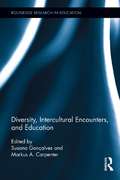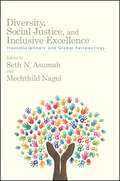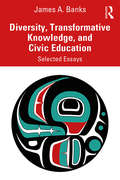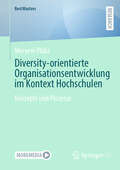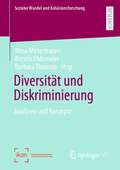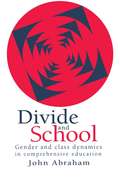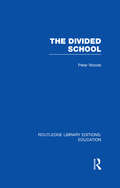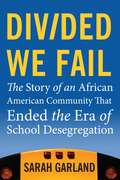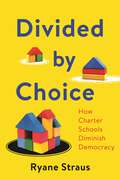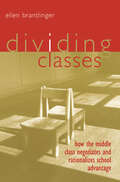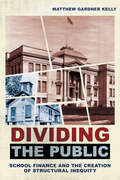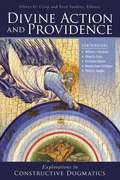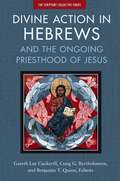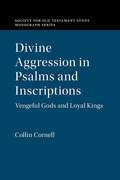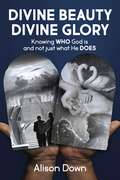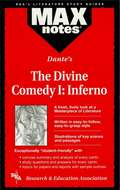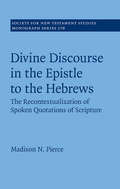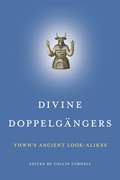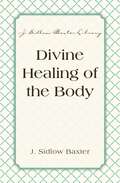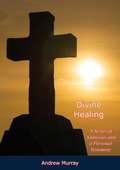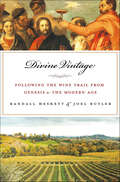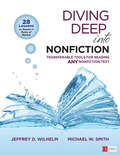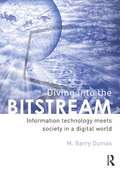- Table View
- List View
Diversity, Intercultural Encounters, and Education (Routledge Research in Education #86)
by Susana Gonçalves Markus A. CarpenterThis book concerns the challenges and tensions rising from mass migration flows, unbalanced north-south and east-west relations and the increasing multicultural nature of society. The scope of the book’s theme is global, addressing diversity and identity, intercultural encounters and conflict, and the interrogations of a new socio-political order or paradigm. Thus, it highlights some of the most poignant and challenging outcomes of cultural diversity faced more or less palpably by everyone everywhere in today’s societies. The book’s theme of multi- and pluriculturality is of particular current interest in the academic, socio-political, economic and entrepreneurial spheres. It covers Western and non-Western perspectives, representing a valuable resource in terms of international dialogue and experimentation. The chapters are complimentary, completing a rigorous theoretical framework offering detailed presentation and analysis of the phenomenon of diversity as encountered in society and the educational setting and at large viewed in a multidisciplinary multiperspective fashion. Among the theories and concepts represented are those intrinsic to sociology, psychology, political science, economics, history, literature, pedagogy, communication and linguistics.
Diversity, Social Justice, and Inclusive Excellence: Transdisciplinary and Global Perspectives
by Seth N. Asumah; Mechthild NagelWinner of the 2016 NYASA Book Award presented by the New York African Studies AssociationWhen students are introduced to the study of diversity and social justice, it is usually from sociological and psychological perspectives. The scholars and activists featured in this anthology reject this approach as too limiting, insisting that we adopt a view that is both transdisciplinary and multiperspectival. Their essays focus on the components of diversity, social justice, and inclusive excellence, not just within the United States but in other parts of the world. They examine diversity in the contexts of culture, race, class, gender, learned ability and dis/ability, religion, sexual orientation, and citizenship, and explore how these concepts and identities interrelate. The result is a book that will provide readers with a better theoretical understanding of diversity studies and will enable them to see and think critically about oppression and how systems of oppression may be challenged.
Diversity, Transformative Knowledge, and Civic Education: Selected Essays
by James A. BanksThe essays collected in this book, by James A. Banks, a foundational figure in the field of multicultural education, illuminate the interconnection between the author’s work on knowledge construction and civic education. In pieces both poignant and personal, Banks shares some of his most groundbreaking and innovative work. Diversity, Transformative Knowledge, and Civic Education aims to unpack the "citizenship-education dilemma," whereby education programs strive to teach students democratic ideals and values within social, economic, political, and educational contexts that contradict justice, equality, and human rights. For change to take place, students need to internalize democratic values, by directly experiencing them in transformative classrooms and schools that are envisioned and described in this book. Drawn from Banks’ formidable canon, this collection highlights the conceptual, curricular, and pedagogical issues related to this dilemma, and signals a fundamental shift toward transformative citizenship education. Students, scholars and educators in the fields of multicultural education, civic education, social studies education, comparative education, and the foundations of education will find this book to be a valuable resource for discussion and discovery.
Diversity-orientierte Organisationsentwicklung im Kontext Hochschulen: Konzepte und Prozesse (BestMasters)
by Meryem YildizHochschulen präsentieren Diversity oft als glänzendes Aushängeschild, doch was verbirgt sich wirklich dahinter? Diese Studie enthüllt die versteckten Machtkämpfe und Barrieren, die den Weg zu echter Bildungsgerechtigkeit versperren. Mit einem kritischen Blick auf die Prozesse der Entstehung und Umsetzung von Diversity-Konzepten an deutschen Hochschulen zeigt die Forschung, dass oberflächliche Ansätze nicht ausreichen. Stattdessen sind tiefgreifende, transformative Veränderungen notwendig, um nachhaltige Inklusion zu schaffen. Ein unverzichtbarer Beitrag für alle, die sich für echte Chancengleichheit im akademischen Kontext einsetzen.
Diversität und Diskriminierung: Analysen und Konzepte (Sozialer Wandel und Kohäsionsforschung)
by Barbara Thiessen Mina Mittertrainer Kerstin OldemeierDiversität gilt heute in Bildungsinstitutionen, sozialen Einrichtungen oder Unternehmen nicht nur als selbstverständlich, sondern auch als Bereicherung und bedeutsam für Kreativität in Teams. Gleichwohl geht mit Diversität immer noch Diskriminierung in unterschiedlichen Formen und Intensitäten einher. Zu fragen ist, welche Dynamiken hier wirksam sind und wie diese Verbindung zu kappen wäre. Zentrales Anliegen des Sammelbandes ist daher, Diversität als komplexe Kategorie mit interdisziplinären Zugängen und aus machtkritischer Perspektive zu diskutieren. Zunächst liegt der Fokus dabei auf empirisch rekonstruierten Bedingungen für Diskriminierungen. Im zweiten Teil werden analytische Weiterentwicklungen im Hinblick auf theoretische Verortungen und konzeptionelle Perspektiven entfaltet. Im dritten Teil werden Handlungskonzepte und Praxiserfahrungen in unterschiedlichen Bildungskontexten vorgestellt.
Divide And School: Gender And Class Dynamics In Comprehensive Education
by John AbrahamFirst published in 1995. Routledge is an imprint of Taylor & Francis, an informa company.
Divided School (Routledge Library Editions: Education)
by Peter WoodsIn this ethnographic study of a secondary school in the UK, the author presents an incisive account of school life from the various points of view of the pupils, teachers and parents. He describes and analyses major areas of experience and methods of adapting to school for both the children and their teachers; school experience is shown to be widely varying from boredom, despair and humiliation, to gaiety, exultation and comradeship some of it officially and some of it unofficially sponsored. The description reveals a number of marked and interpenetrating divisions within schools: between teachers and pupils, parents and teachers, parents and children and between pupils themselves. These divisions are explored, analysed and related both to institutional factors and to factors outside the school. The study suggests how these factors influence pupil and teacher strategies, and hence how the details of school life relates to wider society.
Divided We Fail: The Story of an African American Community That Ended the Era of School Desegregation
by Sarah GarlandExamines why school desegregation, despite its success in closing the achievement gap, was never embraced wholeheartedly in the black community as a remedy for racial inequality In 2007, a court case originally filed in Louisville, Kentucky, was argued before the Supreme Court and officially ended the era of school desegregation-- both changing how schools across America handle race and undermining the most important civil rights cases of the last century. Of course, this wasn't the first federal lawsuit to challenge school desegregation. But it was the first--and only--one brought by African Americans. In Divided We Fail, journalist Sarah Garland deftly and sensitively tells the stories of the families and individuals who fought for and against desegregation. By reframing how we commonly understand race, education, and the history of desegregation, this timely and deeply relevant book will be an important contribution to the continued struggle toward true racial equality.
Divided by Choice: How Charter Schools Diminish Democracy
by Ryane McAuliffe StrausHow race and capitalism shape educationSchool choice programs—such as vouchers, education savings accounts, and tax credit scholarships—are surrounded by controversy, raising questions about their impact on student diversity and inequality. In this book, Ryane McAuliffe Straus takes up a core part of this divisive debate, exploring why charter schools are reshaping America’s education system—and democracy—for the worse.Drawing on interviews with elected officials, policy entrepreneurs, parents, and activists in Albany, NY, Straus argues that charter schools are a poor alternative to failing public schools, ultimately worsening racial segregation under the guise of providing underprivileged students with access to better education. Taking a wide-ranging view, the author explores why parents, elected officials, and community activists may or may not choose to leave the public education system by enrolling their children in charter schools.Straus finds that when families of color leave public schools in favor of charter schools this removes their democratic voice and participation, diminishing their political power in a high-stakes area of public policy. Divided by Choice highlights the fundamental flaws of one solution to public education inequalities, at a time when racial tensions are at an all-time high.
Dividing Classes: How the Middle Class Negotiates and Rationalizes School Advantage
by Ellen BrantlingerIn this study of the school system of an Indiana town, Ellen Brantlinger studies educational expectations within segments of the middle class that have fairly high levels of attainment. Building on her findings, she examines the relationship between class structure and educational success. This book asserts the need to look beyond poor peoples' values and aspirations--and rather to consider the values of dominant groups--to explain class stratification and educational outcomes.
Dividing the Public: School Finance and the Creation of Structural Inequity (Histories of American Education)
by Matthew Gardner KellyIn Dividing the Public, Matthew Gardner Kelly takes aim at the racial and economic disparities that characterize public education funding in the United States. With California as his focus, Kelly illustrates that the use of local taxes to fund public education was never an inadvertent or de facto product of past practices, but an intentional decision adopted in place of well-known alternatives during the Progressive Era, against past precedent and principle in several states.From efforts to convert expropriated Indigenous and Mexican land into common school funding in the 1850s, to reforms that directed state aid to expanding white suburbs during the years surrounding World War II, Dividing the Public traces, in intricate detail, how a host of policies connected to school funding have divided California by race and class over time. In bringing into view the neglected and poorly understood history of policymaking connected to school finance, Kelly offers a new story about the role public education played in shaping the racially segregated, economically divided, and politically fragmented world of the post-1945 metropolis.
Divine Action and Providence: Explorations in Constructive Dogmatics (Los Angeles Theology Conference Series)
by ZondervanThinking Clearly and Deeply about the Theology of God's Intervention in the World.The claim that God acts in the world is surely a basic theological claim, but it's one that has been understood in a wide variety of ways in the Christian theological tradition. In some accounts, God appears as the largest, first, and most powerful agent. In others, God is portrayed as the transcendent ground of all finite agency, while never acting on the same plane as other agents...Divine Action and Providence represents the proceedings of the seventh annual Los Angeles Theology Conference, which invited theologians across Christian traditions to contribute their constructive accounts and proposals to the theology of God's relation to and intervention in the world.The eleven diverse essays in this collection include discussions on:The particularity and detail of divine action.Recovering the identity of the God of providence.The theological meaning of the course of history.The nature of omnipotence.Each of the essays collected in this volume engage with Scripture as well as with others in the field—theologians both past and present, from different confessions—in order to provide constructive resources for contemporary systematic theology and to forge a theology for the future.
Divine Action in Hebrews: And the Ongoing Priesthood of Jesus (The Scripture Collective Series)
by ZondervanRecent years have seen renewed interest in divine action, but much of the literature tends to focus on the science-theology discussion. Resulting from multi-year work of the Scripture and Doctrine Seminar, part of KLC's Scripture Collective, this book attends to the portrayal of divine action in one major biblical text, namely Hebrews. In the New Testament, Hebrews is on par with Romans in terms of importance but has too often been overlooked. Contributors to this volume explore the many different ways in which divine action is foregrounded and portrayed in Hebrews. As its name indicates, Hebrews overflows with Old Testament intertextuality, which also makes it a fertile ground for analysis of divine action stretching back into the Old Testament and opening out into different parts of the NT. The essays in this volume:rigorously work the interface of theology and exegesis, all related to Hebrews;offer an overview of the current state of discussion of divine action and the importance of exploring divine action in specific biblical texts, with special reference to William Abraham's recent 4 volume work with OUP;provide an overview of the reception history of Hebrews in theologies of divine action;explore how this has this played out in historical theology and what a retrieval of Hebrews for a theology of divine action might mean today;explore the relationship between the doctrine of God and divine action in Hebrews, including an engagement with classical theism;provocatively explore divine action in the OT, creation, and eschatology in Hebrews;explore the major theme in Hebrews of divine action through the ongoing priesthood of Jesus as portrayed in Hebrews;relate this all to preaching Hebrews today and to spiritual formation.The book's conclusion reflects on the primary action of God speaking in Hebrews.
Divine Aggression in Psalms and Inscriptions: Vengeful Gods and Loyal Kings (Society for Old Testament Study Monographs)
by Collin CornellThe aggression of the biblical God named Yhwh is notorious. Students of theology, the Bible, and the Ancient Near East know that the Hebrew Bible describes Yhwh acting destructively against his client country, Israel, and against its kings. But is Yhwh uniquely vengeful, or was he just one among other, similarly ferocious patron gods? To answer this question, Collin Cornell compares royal biblical psalms with memorial inscriptions. He finds that the Bible shares deep theological and literary commonalities with comparable texts from Israel's ancient neighbours. The centrepiece of both traditions is the intense mutual loyalty of gods and kings. In the event that the king's monument and legacy comes to harm, gods avenge their individual royal protégé. In the face of political inexpedience, kings honour their individual divine benefactor.
Divine Beauty Divine Glory: Knowing WHO God is and not just what He DOES
by Alison M. Downs“The Beauty and the Glory of the Divine” by Alison M. Down is an astute look at the Exodus story that focuses on one Figure that too often remains hidden behind a monumental figure of Moses, and manifold events of the book–on God, the Leader of the Exodus. As we live in an efficiency driven society, we tend to look at actions and results as the highest priority. While the book of Exodus is indeed packed with actions, and as it results in a radical change in history, many Christians tend to overlook the main purpose of the book of Exodus. The main purpose of this, and of every other book of the Holy Scripture, and of the Word Incarnate is to reveal God the Father. Alison in her dynamic study has grabbed the very nerve of the Exodus narrative: the revelation of the Divine Holiness and other attributes and characteristics of God to sinful humankind.As this emphasis is lost–and, unfortunately, it’s been lost in too many publications–the main purpose of the book of Exodus remains only as a potential. On the other hand, Alison helps a reader to refocus from a traditional study of peoples and events of Exodus, to the God of Exodus. The study is carefully organized after the events of the Exodus, yet with each chapter, with each page we come closer not just to the Promised Land, but we come to better understand God-the true Leader of the Exodus.As a systematic theologian I see that this book is needed for two main reasons. First, it provides a unique focus of God. Second, “The Beauty and the Glory of the Divine” by Alison M. Down helps Christians to bridge what seems to be a gap between the God of the Old Testament and His Son Jesus Christ. This study is fun to read, as a reader would certainly share in Alison’s excitement over many personal discoveries. The book is also valuable as it provides numerous parallel stories and texts from other books of the Bible. That solidifies this research and makes reading more diverse and interesting. “I would certainly recommend this material to any diligent student of the book of Exodus.” --Dr. Oleg Zhigankov, PhD, Systematic and Historical Biblical Studies; Pastor North Bay and South River Churches, Ontario Conference of Seventh Day Adventists
Divine Comedy I: Inferno, The (MAXNotes Literature Guides)
by Anita Price DavisREA's MAXnotes for Dante's The Divine Comedy I: Inferno MAXnotes offer a fresh look at masterpieces of literature, presented in a lively and interesting fashion. Written by literary experts who currently teach the subject, MAXnotes will enhance your understanding and enjoyment of the work. MAXnotes are designed to stimulate independent thought about the literary work by raising various issues and thought-provoking ideas and questions. MAXnotes cover the essentials of what one should know about each work, including an overall summary, character lists, an explanation and discussion of the plot, the work's historical context, illustrations to convey the mood of the work, and a biography of the author. Each chapter is individually summarized and analyzed, and has study questions and answers.
Divine Discourse in the Epistle to the Hebrews: The Recontextualization of Spoken Quotations of Scripture (Society for New Testament Studies Monograph Series #178)
by Madison N. PierceIn this book, Madison N. Pierce analyzes the use of prosopological exegesis by the author of Hebrews in almost every major quotation of Scripture. She shows that the author uses Scripture in a consistent way that develops his characterization of God - Father, Son, and Spirit - and that results in a triune portrait of God in Hebrews. Offering a detailed reading of several passages, she also demonstrates how the author's portrayal of God is consistent with later theological developments. Pierce's method replaces atomistic approaches and allows readers to see a clear pattern of usage across the entire epistle. It offers researchers a tool for examining quotations of New Testament Scripture and will be of particular interest to those working in the field of trinitarian theology.
Divine Doppelgängers: YHWH’s Ancient Look-Alikes
by Collin CornellThe Bible says that YHWH alone is God and that there is none like him—but texts and artwork from antiquity show that many gods looked very similar. In this volume, scholars of the Hebrew Bible and its historical contexts address the problem of YHWH’s ancient look-alikes, providing recommendations for how Jews and Christians can think theologically about this challenge.Sooner or later, whether in a religion class or a seminary course, students bump up against the fact that God—the biblical God—was one among other, comparable gods. The ancient world was full of gods, including great gods of conquering empires, dynastic gods of petty kingdoms, goddesses of fertility, and personal spirit guardians. And in various ways, these gods look like the biblical God. Like the God of the Bible, they, too, controlled the fates of nations, chose kings, bestowed fecundity and blessing, and cared for their individual human charges. They spoke and acted. They experienced wrath and delight. They inspired praise. All of this leaves Jews and Christians in a bind: how can they confess that the God named YHWH was (and is) the true and living God, in view of this God’s profound similarities to all these others?The essays in this volume address the theological challenge these parallels create, providing reflections on how Jews and Christians can keep faith in YHWH as God while acknowledging the reality of YHWH’s divine doppelgängers. It will be welcomed by undergraduates studying religion; seminarians and graduate students of Bible, theology, and the ancient world; and adult education classes.
Divine Doppelgängers: YHWH’s Ancient Look-Alikes
by Collin CornellThe Bible says that YHWH alone is God and that there is none like him—but texts and artwork from antiquity show that many gods looked very similar. In this volume, scholars of the Hebrew Bible and its historical contexts address the problem of YHWH’s ancient look-alikes, providing recommendations for how Jews and Christians can think theologically about this challenge.Sooner or later, whether in a religion class or a seminary course, students bump up against the fact that God—the biblical God—was one among other, comparable gods. The ancient world was full of gods, including great gods of conquering empires, dynastic gods of petty kingdoms, goddesses of fertility, and personal spirit guardians. And in various ways, these gods look like the biblical God. Like the God of the Bible, they, too, controlled the fates of nations, chose kings, bestowed fecundity and blessing, and cared for their individual human charges. They spoke and acted. They experienced wrath and delight. They inspired praise. All of this leaves Jews and Christians in a bind: how can they confess that the God named YHWH was (and is) the true and living God, in view of this God’s profound similarities to all these others?The essays in this volume address the theological challenge these parallels create, providing reflections on how Jews and Christians can keep faith in YHWH as God while acknowledging the reality of YHWH’s divine doppelgängers. It will be welcomed by undergraduates studying religion; seminarians and graduate students of Bible, theology, and the ancient world; and adult education classes.
Divine Healing Of The Body (J. Sidlow Baxter Library)
by J. Sidlow BaxterDivine Healing of the Body covers the history of healing through the centuries as well as how divine healing is present today through the Atonement, and how we experience divine healing today.
Divine Healing: A Series of Addresses and a Personal Testimony
by Andrew MurrayIn this concise and easily understood volume Murray covers scripture in both the Old and New Testaments proving that healing is provided in the death of Christ, that it is God’s will to heal, that laying-on of hands and confession of sin are the way to healing and that sickness is related to sin.Though written some time ago, this book is for today! It will answer pertinent questions people are asking as they experiment with using the power of Christ to heal themselves and others.
Divine Vintage: Following the Wine Trail from Genesis to the Modern Age
by Randall Heskett Joel ButlerWinner of the Gourmand Wine Books prize for 'Best Drinks Writing Book' in the UK A fascinating journey through ancient wine country that reveals the drinking habits of early Christians, from Abraham to Jesus. Wine connoisseur Joel Butler teamed up with biblical historian Randall Heskett for a remarkable adventure that travels the biblical wine trail in order to understand what kinds of wines people were drinking 2,000 to 3,500 years ago. Along the way, they discover the origins of wine, unpack the myth of Shiraz, and learn the secrets of how wine infiltrated the biblical world. This fascinating narrative is full of astounding facts that any wine lover can take to their next tasting, including the myths of the Phoenician, Greek, Roman, and Jewish wine gods, the emergence of kosher wine, as well as the use of wine in sacrifices and other rites. It will also take a close a look at contemporary modern wines made with ancient techniques, and guide the reader to experience the wines Noah (the first wine maker!) Abraham, Moses and Jesus drank.
Diving Deep Into Nonfiction, Grades 6-12: Transferable Tools for Reading ANY Nonfiction Text (Corwin Literacy)
by Michael W. Smith Jeffrey D. Wilhelm"General reading strategies and teacher-developed questions will only take our students so far—with our approach, students gain astounding independence because they engage directly with the nonfiction author, and with how that author used specific details (moves) and structures to communicate meanings and effects." —Wilhelm and Smith All nonfiction is a conversation between the writer and the reader, an invitation to agree or disagree with compelling and often provocative ideas about some aspect of the world we live in. At the end of the day, it’s our responsibility to decide if the argument is sound. With Diving Deep Into Nonfiction, Jeffrey D. Wilhelm and Michael W. Smith deliver a revolutionary teaching framework that helps students read well by noticing the rules and conventions of this dynamic exchange. The classroom-tested lessons include engaging short excerpts and teach students to be powerful readers who know both how authors signal what’s worth noticing in a text and how readers connect and make meaning of what they have noticed. No matter what they are reading, students learn to be on high alert, and highly curious about how texts work and what they mean, as they learn to notice direct statements of principle, calls to attention, ruptures, and readers’ rules of notice: Notice the topics and the textual conversation: Who is speaking and how might he or she be responding to another’s ideas? What is the idea that gives "heat" to this text? Notice key details: What attracts my attention? How does the author signal both direct and implicit statements of meaning? How does the author use the unexpected? How can I interpret patterns of key details to see overall meanings? Notice varied nonfiction genres: What are the essential features of this kind of text? How does the author employ them? What effects are they designed to have on the reader? Notice text structure: How does the author structure the text to connect details and ideas? What patterns of thought does the author use along the way? With Diving Deep Into Nonfiction, Wilhelm and Smith upend current practices, and it’s high time. Once your students engage with these lessons, you’ll never go back to the same old tired approach— and reading across content areas enters a whole new era.
Diving Deep Into Nonfiction, Grades 6-12: Transferable Tools for Reading ANY Nonfiction Text (Corwin Literacy)
by Michael W. Smith Jeffrey D. Wilhelm"General reading strategies and teacher-developed questions will only take our students so far—with our approach, students gain astounding independence because they engage directly with the nonfiction author, and with how that author used specific details (moves) and structures to communicate meanings and effects." —Wilhelm and Smith All nonfiction is a conversation between the writer and the reader, an invitation to agree or disagree with compelling and often provocative ideas about some aspect of the world we live in. At the end of the day, it’s our responsibility to decide if the argument is sound. With Diving Deep Into Nonfiction, Jeffrey D. Wilhelm and Michael W. Smith deliver a revolutionary teaching framework that helps students read well by noticing the rules and conventions of this dynamic exchange. The classroom-tested lessons include engaging short excerpts and teach students to be powerful readers who know both how authors signal what’s worth noticing in a text and how readers connect and make meaning of what they have noticed. No matter what they are reading, students learn to be on high alert, and highly curious about how texts work and what they mean, as they learn to notice direct statements of principle, calls to attention, ruptures, and readers’ rules of notice: Notice the topics and the textual conversation: Who is speaking and how might he or she be responding to another’s ideas? What is the idea that gives "heat" to this text? Notice key details: What attracts my attention? How does the author signal both direct and implicit statements of meaning? How does the author use the unexpected? How can I interpret patterns of key details to see overall meanings? Notice varied nonfiction genres: What are the essential features of this kind of text? How does the author employ them? What effects are they designed to have on the reader? Notice text structure: How does the author structure the text to connect details and ideas? What patterns of thought does the author use along the way? With Diving Deep Into Nonfiction, Wilhelm and Smith upend current practices, and it’s high time. Once your students engage with these lessons, you’ll never go back to the same old tired approach— and reading across content areas enters a whole new era.
Diving Into the Bitstream: Information Technology Meets Society in a Digital World
by Barry M. DumasNationwide, and indeed worldwide, there has been a growing awareness of the importance of access to information. Accordingly, information technology (IT), broadly defined and its role beyond the internal workings of businesses has leapt into the social consciousness. Diving into the Bitstream distinguishes itself by weaving together the concepts and conditions of IT. What distinguishes these trends is their focus on the impacts of IT on societies, and the responsibilities of IT's creators and users. The author pulls together important, often complex issues in the relationships among information, information technologies, and societal constructs. The text explores a synopsis of these issues that are foundations for further consideration.
